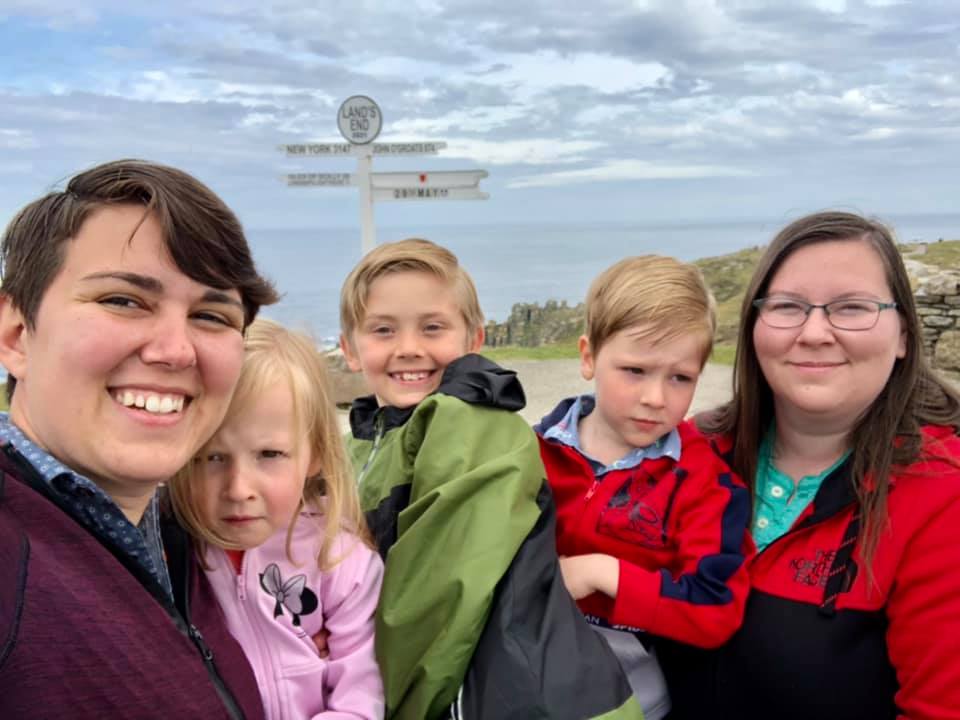By Emily Starbuck Gerson
Kia and Cassandra Carvalheira know that military life can be hard on their three children at times, but the positives they’ve experienced — especially from living abroad for many years — have been well worth it.
This lesbian couple met in Wichita, Kansas, in 2012 when Cassandra was stationed there as a young enlisted Airman. The pair married the following year, though at the time, Kansas didn’t recognize their marriage. This created complications when the pair wanted to adopt Kia’s nephew, Connor.
Later on, the couple wanted to have a child via assisted reproduction, which presented different challenges. While their marriage was then recognized nationally, they had to navigate legal landmines, pay out-of-pocket expenses, and deal with a system structured for heterosexual couples. Out of the process, however, came a wonderful gift: a pair of twins, Colton and Kennedy.
The Carvalheiras were stationed in England from 2016 to 2019. After a short stint back in the United States, they returned to England in 2020, where Cassandra serves as a Maintenance Officer and Kia is a full-time student. Connor is now nearly 11 years old, and the twins are 6.
In honor of the Month of the Military Child, MMAA interviewed Kia to learn more about the ups and downs of family-building as a same-sex military spouse and how her kids benefit from their unique experiences.
Modern Military Association of America: When you decided to adopt your eldest child, what are some of the barriers you encountered?
Kia Carvalheira: When we decided to have children, we lived in a state that did not recognize our marriage. Our oldest son was adopted, and at the time, only I was allowed to adopt him because they said if it was Cassandra and me, the adoption would get denied.
Overall, the adoption process was relatively easy because I was adopting my nephew. It was only difficult because only I was allowed to adopt him at the time, but they still wanted all of Cassandra’s information when we did the home inspection and background check.
Once Kansas allowed for same-sex adoption, we had to do the process of adoption all over again, with me giving Cassandra permission to adopt our son. The military allowed for her to take adoption leave once she legally adopted him, and they also reimbursed us for a portion of the fees we paid when Cassandra adopted him.
MMAA: When you wanted to have more children and carry, what was the process like as an LGBTQ+ military spouse, and what were some of the concerns you faced?
KC: With our twins, who I carried, we had to use a donor from a sperm bank rather than a friend, because even if we were to have the friend sign his rights away to the child, Kansas would still have given him rights over Cassandra. Even with legal documentation stating he was not the father and just a sperm donor.
As for the process with the twins, we used IUI, and the military paid for all of the medical appointments, my medications, and any tests that needed to be run. They would not cover the cost of the actual insemination or the sperm. We paid out of pocket for those expenses. Our sperm from the bank cost about $900 and the insemination procedure was $250. It took us five tries to conceive the twins.
MMAA: What are some areas and processes that you think the military could improve to make reproductive assistance and adoption easier for same-sex couples?
KC: The military could expand the bases that allow for doctors to do the insemination procedure and cover the cost of the procedure for those individuals who are not close enough to the bases that do it.
There are only currently a handful of bases that an active duty member or spouse can go to to have a military medical provider perform the insemination. Most inseminations do not take the first few times, so they would have to travel to that base every month. This can be costly, even if they are reimbursed for the travel.
The military also needs to cover the cost for those who choose to go to a non-military provider for the insemination. We were told that we had to pay the cost because TRICARE would only cover it if the female trying to get pregnant was medically infertile. Although I was not medically infertile, two women can not create a child the same way a man and a woman can. Even with that argument, they still would not cover it.
The military also needs to create classes for non-birthing parents that allow for men and women. When we were doing our birthing classes, they had a class open to both parents and also a class that was called “Dad’s 101” to teach how to change diapers, ask questions, and teach basic care for a newborn.
Cassandra asked to join this class because she was also a non-birthing parent, and they told her that she was not allowed to go because the men in the class would not feel comfortable. We have been working with a couple who had a baby recently and are trying to push for this change at our base and across the Air Force.
I also think that the military needs to work on training that teaches medical providers to stop saying “mom and dad” and say “parent” instead. During doctor appointments, my children constantly get asked, “What does your daddy do?” Their response is “I don’t have a dad,” which makes my children feel uncomfortable.
MMAA: Were there any pleasant surprises in either experience of family-building?
KC: One of the most pleasant surprises we had while trying to expand our family was when the medical provider who was responsible for the insemination allowed Cassandra to inject the sperm.
The provider asked if she wanted to do it so she could feel like she helped make the baby. Something that small made a huge impact on her feelings and made her feel like she was a part of it.
MMAA: In closing, given that this is the Month of the Military Child, what are some of the benefits of military life that your kids have experienced?
KC: Being military children, they have learned that you can be apart from someone for years, but when you get together again, it’s like no time has passed and the friendship picks up right where it left off. They have also learned how to make friends anywhere they go.
Also with being overseas, they have gotten to travel to places that they might have never been. Before the twins were even a year old, they had already traveled to more countries than most American children. They might not remember it, but we took plenty of pictures to show them.
They have also learned how to embrace any new situation and thrive from it. We try to expose them to as much of the culture wherever we are as much as we possibly can.


